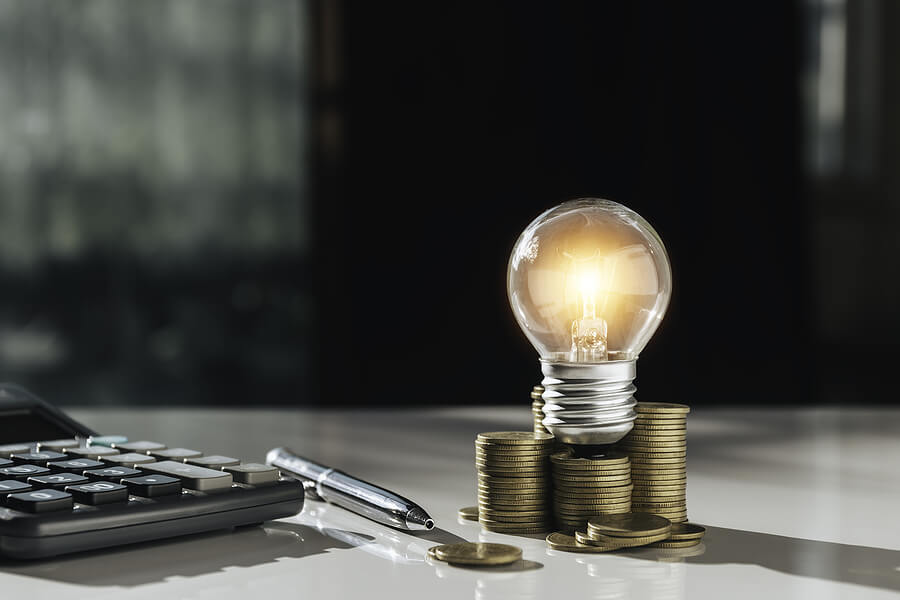It’s easy to make small improvements in your power usage on a daily basis. It’s not much, but it can add up to significant energy savings. Here are thrifty tips for easy ways to save money and energy at home.

Make small changes to your day-to-day habits.
You don’t have to go out and buy energy-efficient items to cut down on your home’s energy usage. Turning off lights and appliances while they are not in use is an easy way to save energy. You can also save energy by doing household chores by hand, such as hanging your clothes to dry instead of placing them in the dryer or hand-washing your dishes.
Turning down the heat in your thermostat in the winter and using your air conditioner less in the summer are the behavioral changes with the most potential for utility savings. Heating and cooling costs account for approximately half of a typical household’s energy bills, so lowering the strength and frequency of heating and cooling would save the most money. In addition, you can compare electricity rates to ensure you get the best deal from your provider, you can make a big difference in your electric bill.
You can use tools to find out where the majority of your energy goes in your home and which appliances use the most electricity on a daily basis.
Reduce your water heating costs
Water heating accounts for a large portion of your overall energy consumption. You can save money on water heating by actually using less hot water, turning down the thermostat on your water heater, or insulating your water heater and the first six feet of hot and cold water tubing, in addition to buying a water heater.
If you’re thinking of replacing your current water heater with a more energy-efficient model, keep two things in mind: the type of water heater you want and the type of fuel it will use. Tankless water heaters, for example, are energy efficient, but they’re not a good option for large families because they can’t accommodate multiple and simultaneous hot water uses.
Install a smart or programmable thermostat
A programmable thermostat can be designed to automatically turn off or minimize heating and cooling. You can eliminate unnecessary energy usage from heating and cooling by installing a programmable thermostat without having to update your HVAC system.
Replace the bulbs in your light fixtures
Traditional incandescent light bulbs use far more energy and must be replaced more often than their energy-saving counterparts. Halogen incandescent bulbs, compact fluorescent lights (CFLs), and light-emitting diode bulbs use 25-80% less energy and last 3 to 25 times longer than standard bulbs (LEDs).
While energy-efficient bulbs are potentially more costly, their efficient energy usage and longer lifetimes result in lower long-term costs.
Make your home more energy efficient
Weatherizing your home, or sealing air holes, is a smart way to save money on heating and cooling. The most common sources of air leakage in your home are vents, windows, and doors. To prevent leaks, make sure there are no gaps or holes between the wall and the fan, window, or doorframe.
Caulk may be used to plug air leaks between stationery items like the wall and window frame. Weatherstripping may be used to seal gaps between moving items such as operable windows and doors. Weatherstripping and caulking are inexpensive air sealing methods that usually pay for themselves in less than a year. Plumbing, ducting, and electrical wiring can all cause air leakage through holes in the walls, floors, and ceilings.
The most common source of air leakage into your attic is through small openings in the home’s interior. Whether by ducts, light fixtures, or the attic hatch, hot air rises and escapes through small holes. If your attic is not well insulated, these small openings will raise your heating bill because heat flows naturally from warmer to cooler areas.
Consider absolutely insulating your home if you want to get the most out of weatherization.
But energy efficiency doesn’t stop there. By looking for an electric supplier with cheap rates but exemplary service, you’ll be able to make your home energy efficient. Whether you live in Pittsburgh looking for a reliable Pittsburgh electricity company or staying in Philadelphia, having an energy supplier that can address your needs will surely help you save money.
Make sure your house is properly insulated
Insulation lets you save money on your heating bills by preserving heat in the winter and stopping heat from entering your home in the summer. Where you live defines the recommended degree of heat resistance, or “R-value,” for your insulation. The recommended R-value for buildings in warmer climates is much lower than for buildings in colder climates like the Northeast.
The amount of insulation you need depends on the size of your home. The five key places that you can consider installing insulation are your attic, walls, floors, basement, and crawlspace.
To Conclude
For a variety of purposes, saving energy is necessary and beneficial. Simple energy-saving measures will help you save money, improve the value of your home, and protect the environment. These are fantastic advantages to saving energy, regardless of why you started conserving in the first place. You can start living a more energy-conscious lifestyle by simply taking a small step.



Great tips for saving money and energy at home. Thanks for sharing helpful tips and please keep sharing.